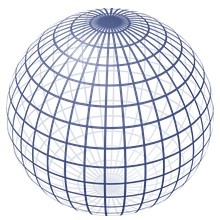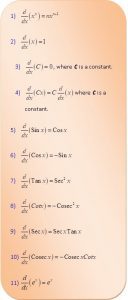Differentiation
Have you ever inflated a spherical balloon?
What do we observe? As we start inflating the balloon its radius starts increasing and consequently, its volume also starts increasing.

Volume V of the spherical balloon is given by, V=.
If r=1 cm then V = .
If r=2 cm then V= .
If we want to find the rate at which the volume V increases as the radius r increases, then we want to find the rate of change of Volume with respect to the radius.
So, if we want to find the rate of change of a dependent variable (Volume V here) with respect to independent variable (radius r here), we want to find or
(r).
Here we will introduce the concept of Differentiation.
I. Derivative of a function at a point.
Let f(x) be a real valued function and x = c be any point in its domain, then the derivative of f(x) at x= c is denoted by (c) and it is defined by f(c)=lim
provided this limit exists.
II. Derivative of a function in general.
In general, the derivative of f(x) is denoted by (x) and it is defined by
(x)=lim
provided this limit exists.
Also, if y = f(x), then the derivative or the differential coefficient of f(x) with respect to x is denoted by or
or
(x).
The process of finding the derivative of a function is called Differentiation.
To differentiate a function (x) means to find its derivative
(x).
Derivative of some standard functions
Algebra of Derivative of functions
If f(x) and g(x) be any two functions such that their derivatives are defined over the common domain then
[f(x)+g(x)]=
f(x)+
g(x)
[f(x)-g(x)]=
f(x) –
g(x)
[f(x)g(x)]=g(x)
f(x) + f(x)
g(x)
This is also known as Product Rule of Differentiation.
=
where g(x)
0.
This is also known as Quotient Rule of Differentiation
Examples
Now let’s consider some examples on differentiation .
Example 1: Find the derivative of f(x)= + 3x.
(x)=
(
) +3
(x)=11
+3(1)=11
+3
Example 2: Find the derivative of f(x)=7Sin x-3Tan x.
(x)=7
(Sin x) -3
(Tan x)=7Cos x – 3
x
Example 3: Find the derivative of f(x)=Sin xCos x .
(x)=
(Sin xCos x)
Cos x(Sin x) + Sin x
(Cos x)= Cos x(Cos x) + Sin x(-Sin x)using Product rule.
= x –
x
Example 4: Find the derivative of f(x)= .
(x)=
==
using Quotient Rule.
==
Example 5: Find the derivative of f(x)=+20
+15.
(x)=
(
)+20
(
)+
(15)=
= +20(12
)+0=
+240
.
Check Point
Find the derivative of the following functions f(x) with respect to x.
- f(x)=
+20x
- f(x)=Cosx -3Tan x
- f(x)=Sinx Tanx
- f(x)=
- f(x)=5
+ 2
+ 27
Answer Key
- 15
+ 20
- -Sinx – 3
x
- Cosx(Tan x)+Sin x(
x)
- 5
+ 34
Personalized Online Tutoring from eTutorWorld
eTutorWorld offers affordable one-on-one live tutoring over the web for Grades K-12, Test Prep help for Standardized tests like SCAT, CogAT, MAP, SSAT, SAT, ACT, ISEE and AP. You may schedule online tutoring lessons at your personal scheduled times, all with a Money-Back Guarantee. The first one-on-one online tutoring lesson is always FREE, no purchase obligation, no credit card required.
For answers/solutions to any question or to learn concepts, take a FREE TRIAL Session.
No credit card required, no obligation to purchase.
Just schedule a FREE Sessions to meet a tutor and get help on any topic you want!
Learn more about Scientific Method and other important topics with 7th Grade Science Tutoring at eTutorWorld. Our expert science tutors break down the topics through interactive one-to-one sessions. We also offer the advantage of customized lesson plans, flexible schedules and convenience of learning from home.
Pricing for Online Tutoring
| Tutoring Package | Validity | Grade (1-12), College |
|---|---|---|
| 5 sessions | 1 Month | $124 |
| 1 session | 1 Month | $25 |
| 10 sessions | 3 months | $239 |
| 15 sessions | 3 months | $354 |
| 20 sessions | 4 months | $449 |
| 50 sessions | 6 months | $1049 |
| 100 sessions | 12 months | $2049 |



